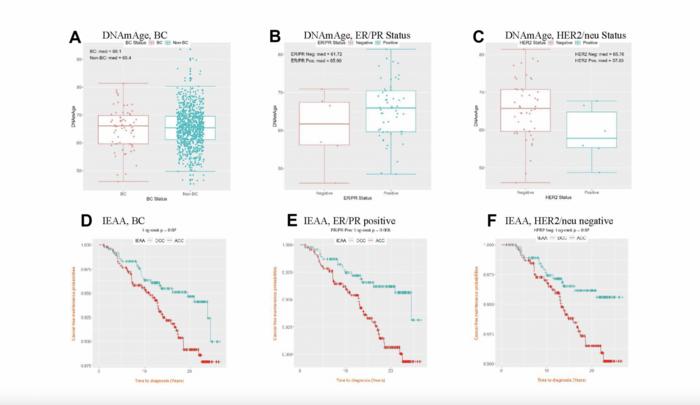A groundbreaking study published in the journal Aging has presented significant findings that may change the landscape of breast cancer screening, particularly for older women. This research highlights the potential of a simple blood test to assess breast cancer risk through the examination of DNA methylation patterns, a crucial aspect of epigenetic aging. Conducted by a team of researchers from the University of California, Los Angeles, and the University of Hawaii Cancer Center, the study offers a compelling narrative on how biological aging can serve as a predictor for breast cancer susceptibility.
The emphasis of the research is on epigenetic aging, which pertains to the biological age of an individual as determined by changes in DNA methylation. DNA methylation is a chemical modification of DNA that plays a significant role in gene regulation and expression. As individuals age, the patterns of methylation change, which can reflect the overall health and aging process within the body. This study found that women with heightened biological age as indicated by their DNA methylation profiles had an increased likelihood of developing breast cancer, suggesting a direct connection between accelerated epigenetic aging and cancer risk.
The subject of this investigation specifically focuses on postmenopausal, non-Hispanic white women, a demographic known to face elevated breast cancer risks especially after menopause. The researchers conducted a detailed analysis of blood samples and discovered a stark correlation: women whose biological markers indicated they were aging more rapidly were statistically more likely to be diagnosed with breast cancer. Intriguingly, this risk was amplified in women who had undergone bilateral oophorectomy before natural menopause, an operation that results in a significant reduction of estrogen levels – a hormone integral to maintaining both breast health and overall physiological processes.
Understanding how estrogen plays a role in both aging and cancer susceptibility is critical. The study suggests that diminished lifetime estrogen exposure directly contributes to the acceleration of aging markers in women, thereby influencing their vulnerability to breast cancer. This finding is particularly relevant for health practitioners and researchers as it underlines the need for tailored approaches in assessing cancer risks in different populations of women, particularly those with varied reproductive histories.
Furthermore, the findings extend beyond biological demographics, as lifestyle factors significantly impact both epigenetic aging and breast cancer susceptibility. The research indicates that obesity is linked to accelerated biological aging, thereby further heightening the cancer risk in obese women. Conversely, the effects of hormone replacement therapy varied depending on the regimen’s type and duration, illustrating the complex relationship between hormonal interventions and cancer risk.
One of the key takeaways from this research is the potential for early detection, which remains a cornerstone of effective breast cancer treatment. The current framework for assessing breast cancer risk often includes conventional factors such as age, family history, and lifestyle habits; however, these determinants may not provide a comprehensive overview of an individual’s actual risk. By integrating a blood test that measures biological aging into the risk assessment protocol, clinicians may better identify high-risk individuals and develop personalized prevention strategies.
As the study points out, utilizing this blood test for routine health screenings for women could revolutionize how healthcare providers approach breast cancer detection. The practical implications are profound, providing women with actionable insights into their health that can empower them to take proactive steps in mitigating risk through healthy lifestyle changes. Enhancing awareness around epigenetic aging could lead to more effective health campaigns promoting balanced diets, regular physical activity, and medically supervised hormone therapies.
Although the findings present promising advancements in breast cancer risk assessment, the authors caution that additional studies are imperative. There remains a need for validation of these findings in broader and more diverse populations to establish the universal applicability of this blood test approach. However, this innovative research offers a non-invasive, cost-effective strategy to predict breast cancer risks, highlighting the intricate connections between genetic health, environmental influences, and disease susceptibility.
In summary, the study advances an intriguing narrative on the importance of biological aging in understanding breast cancer risk, particularly among older women. The exploration of DNA methylation and its implications for epigenetic aging provides new avenues for future research and potential applications in routine medical practice. There lies a collective responsibility among researchers, clinicians, and public health advocates to glean insights from these findings, aiming to enhance breast cancer prevention strategies that could ultimately save lives.
With the continued research into the applications of epigenetic markers in cancer risk evaluation, healthcare may witness a transformative approach to managing breast cancer, leading to safer, more informed health practices for women worldwide.
Subject of Research:
Article Title: DNA-methylation age and accelerated epigenetic aging in blood as a tumor marker for predicting breast cancer susceptibility
News Publication Date: January 21, 2025
Web References:
References:
Image Credits: © 2024 Jung et al.
Keywords: aging, DNA methylation-based marker of aging, pre-diagnostic DNA, breast cancer, tumorigenesis, postmenopausal women
Tags: Accelerated AgingBlood-based BiomarkersBreast Cancer RiskCancer SusceptibilityDNA MethylationEarly cancer detectionEpigenetic AgingEstrogen ExposureHormone Replacement TherapyObesity and CancerPostmenopausal WomenTumor Markers





